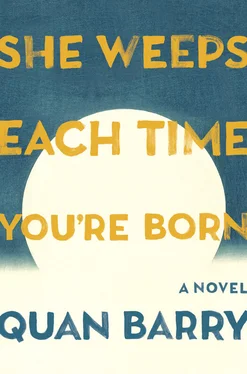The first one was talking, saying words she knew were directed at her. Bà pointed into the hut. She could feel the soldier peering into the darkness, following the line of her finger. We must, she said. There’s still time. Was he understanding? The scrim burned heavy on her eyes. She made motions with her hands as if breaking open a piece of fruit.
More words were said, then the boy was leading her through the orchard, away from the one-room shelter her son had built. In the crisp morning air she could smell the burnt fruit littering the ground. She remembered the day some months before when her neighbors had been relocated by the Americans, the sound of her childhood friend Hong Hanh’s high-pitched keening as the soldiers carried her small body across the road to the waiting helicopter, loose grit whipping through the air, the whole hut shuddering as if it would simply lift off the earth, Hong Hanh’s screams cutting in and out in the wash of the great blades. Mong Yen was a small hamlet of fewer than ten wooden huts. The Americans had cleared the area in under half an hour. Bà and Little Mother lived on the edge of Mong Yen. The day the Americans swept the hamlet, Bà and Little Mother had been curled up like sea horses in the small space Tu had hollowed under the floor during his last and final visit. The creatures of the earth crawling all over them as if they themselves were earth.
The day after her neighbors had been forcibly removed, Bà felt her way through the sugar-apple orchard to Hong Hanh’s two rooms. The ancestors’ bowls were still there on the shelf in the corner. A sheet of muslin lay in a heap in the dirt. Flies crawled over the hardened rice, a few of them drowned in the small dish filled with fish sauce.
For the first few days Bà picked her way through the orchard each afternoon while Little Mother was off working in the fields. Each day she would change the rice, recover the bowls with the muslin. Some days she would light a joss stick and clap her hands together as she bowed her head before fishing the dead flies out of the nuoc mam . By the end of the week none of her prayers had come true, but that wasn’t the reason why she stopped taking care of the family altar of her childhood friend. All her life Bà’s prayers had never come true. She didn’t know anyone whose prayers did.
The final time Bà went next door she stood in front of the altar, the smell of sandalwood spicing the air. A breeze began to blow through the room, though outside the palm trees stood stone still. Then she saw it — a vision of her daughter-in-law lying in the dirt, the girl’s stomach swollen and distended, her face as if dead. All week Bà had prayed for just the opposite. Not now. Please. Not in this world. The last time Tu had been with them, the sound of the couple’s long nights of love filling the air which in a culture of one-room households it was taboo for anyone to acknowledge. For as many nights as it lasted Bà lay in her corner pretending not to hear the rhythmic noises and small groans coming from their mat but remembering her own nights of pleasure long ago in a world at war, hoping they were being careful but knowing that they weren’t.
Later that day after Little Mother came home from the fields, Bà could feel her prayers had not been answered. The girl didn’t even know. She was stirring the rice in a pot over the fire, the aura of the new life filling the room. There would no longer be enough rice to fill the bowl on the altar next door. Little Mother, said Bà for the first time. The scar just above her left breast throbbed. Now you must call me Bà.
And so it had come to pass. Little Mother lying in the dirt in the darkness of their one room, her stomach swollen and distended, her face all but dark. Outside Bà floating through the orchard on the arm of a foreigner.
Finally they arrived at a jeep. Among the soldiers there was more talk like the grunting of animals, the soldiers deferring to the boy who had led her there, the boy their leader. Already he was walking away. It had been years since Bà had ridden in a jeep, not since Terres Noires and the trees that cried white tears. For a moment she felt like a child again, she and her mother with their buckets full of sap.
She could hear the driver drumming on the steering wheel with his fingers. He had yet to start the car. Ash was still wafting through the air. From the backseat, she held her hand out and caught a black flake on the tip of her finger. She was glad to be with these foreigners. It was her own people who would’ve ruined everything. Most times the South Vietnamese soldiers would leave a body where they’d found it, not even caring enough to close the eyes.
Within minutes another soldier climbed in the front seat and slammed the door. The jeep fired up, and she was moving, the ash hitting her in the face. The soldiers were taking her to Cong Heo, the old strategic hamlet built by the Americans. The Americans didn’t even know what Cong Heo meant. She had a way of knowing things she shouldn’t know. The scar on her chest burned like a third eye. She hadn’t crossed the river in years. She knew she wouldn’t cross it now.
Wait. Bà held up her hand. The jeep came to a stop. Carefully she pointed at the house, gesturing that there was something she needed. The driver and the other soldier considered it, grunting among themselves. They were tired and didn’t care, their resignation evident to Bà even as they spoke in their own tongue. Oui , she said, in the only other language she knew. She heard the car door swing open. The other soldier helped her out.
And if the glaze had momentarily lifted from her eyes, she would have seen two soldiers digging by the sugar-apple tree, a body bag lying on the ground, the body already in it. She would have seen another soldier hammering together a makeshift box made of splintery wooden boards from her own house. If Bà’s eyes had been clean, she would have seen the boy-leader approach the long black bag, unzipping it partway, the boy reaching into the void and placing a single bright circle in the corpse’s mouth as someone had done for his own mother years before on the island of Gye-do in the Korean Strait when she died giving birth to him, then sealing the bag up again.
Bà walked straight into the house, her hands at her sides. When she didn’t come back after ten minutes, the driver stubbed out his cigarette and shot the other soldier a look. The soldier got out and ran up to the house, slipping on burnt sugar apples, the smell not unpleasant but for the tang of gasoline lingering in the air. After a minute he came back out shaking his head. The old woman was nowhere to be found. The driver glared at him, but the soldier just bowed and wiped a scorched apple off the bottom of his boot.
Please know that those among us who chewed the betel leaf say they did so for the sting of it. Blood ringing in the silvery chambers of the skull. A rush where normally there would only be inertia. The body’s internal compass trained north even in the darkest dark .
EVER SINCE THE FIREBOMBING ACROSS THE RIVER THE OLD honey seller had been trying not to think about the future. The sun was almost behind the mountains. Her two nearest neighbors had packed up their few remaining chickens and pigs and left hours ago. The day before, the elderly village chief had said it was time. His women carried him down the road in his hammock, his feet never touching the ground. She had heard the routes through the jungle were cut, that the bombers had flattened everything in the free-fire zone for fifty square miles. One full day had passed, and when the wind was right, she could still see black smoke billowing up from across the river.
Huyen sat beside her hovel and spit out a long red stream into the dirt, her teeth the same bloody color as her spit. Inside their patchwork of sticks and canvas, Qui had fallen asleep on a ragged mat. Yesterday Huyen had kicked the girl awake and sent her out alone with an empty jar to check the hives down along the river. The girl didn’t say a word as she took the jar and headed off. She never spoke anymore. The front of her black shirt was always damp and sour smelling, her long tangled hair falling all the way to the backs of her knees. Despite her wan complexion, there was a savage beauty in her face, bones chiseled like a deer’s.
Читать дальше












